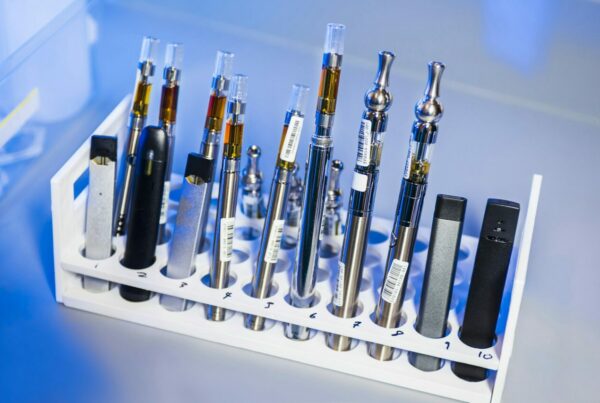N, N-Dimethyltryptamine (DMT) is a naturally occurring compound in both plants and animals, known for inducing powerful, yet short-lived, psychedelic experiences when ingested.
Mounting evidence suggests that DMT, which is naturally produced in the body, plays critical roles in both the peripheral and central nervous systems, potentially serving as a neurotransmitter.
While DMT is capable of inducing strong psychedelic effects, it generally does not trigger severe side effects. However, potential cardiovascular complications may arise when large doses are administered via injection.
Let’s explore DMT and its diverse roles, ranging from recreational use to its promising potential in scientific research and therapeutic uses.

A Brief Introduction to DMT: What is it?
| Aspect | Details |
| Name | N, N-Dimethyltryptamine (DMT) |
| Classification | Indole alkaloid |
| Occurrence | Found naturally in a variety of plants and animals |
| Psychoactive Effects | Induces brief, yet powerful psychedelic experiences upon consumption. |
| Method of Consumption | Can be smoked, injected, or taken orally. |
| Duration of Effects | Effects are short-lived, typically lasting between 5 to 30 minutes. |
| Chemical Structure | Composed of a tryptamine core with two methyl groups attached to the amine nitrogen atom. |
| Metabolism | Rapidly metabolized by the body, broken down by monoamine oxidase (MAO). |
| Cultural Use | Historically used in various ceremonial and shamanic rituals by indigenous cultures. |
| Other names | Dimitrifantasiabusinessman’s tripBusinessman’s special45-minute psychosisspiritual molecule |
DMT’s Relevance in Mental Health
N, N-Dimethyltryptamine (DMT), a compound famous for its potent psychedelic effects, is gaining attention for its potential benefits to mental health. Despite its conventional image as a trigger of intense visionary experiences, recent research suggests a correlation between DMT and mental wellness.
Effects on Psychological and Emotional Well-being
DMT, known for its psychedelic effects, can trigger significant emotional reactions and alter states of consciousness. This potential has opened up new therapeutic avenues for addressing mental health issues, assisting in emotional processing, and providing new perspectives on personal traumas.
Neuroplasticity and Brain Function
Research suggests DMT may influence neuroplasticity, thereby enhancing the brain’s ability to adapt and reorganize. Investigating its impact on synaptic plasticity and neural connectivity could lead to potential treatments for disorders caused by neural disarrangement.
Prospective Therapeutic Use for Mental Health Disorders
Initial studies point to DMT’s potential in treating disorders such as depression, addiction, and PTSD. Its ability to induce mystical or spiritual experiences could provide a unique angle to psychotherapy and aid in reformulating negative thought patterns.
Research into DMT’s natural occurrence within the body demonstrates its significance for mental health resilience, stress response, and overall psychological well-being. Understanding how the body controls internal DMT levels may lay the groundwork for novel therapeutic strategies.
DMT and Mental Health Disorders
| Mental Health Disorder | Description | Effectiveness of DMT | Benefits |
| Depression | A mood disorder characterized by persistent sadness, loss of interest, and reduced motivation | Preliminary research suggests DMT may alleviate symptoms by inducing deep emotional experiences. | Its rapid onset and ability to provoke transformative experiences could offer innovative therapeutic techniques for reformulating negative thought patterns and enhancing emotional processing |
| Post-Traumatic Stress Disorder (PTSD) | A mental health disorder triggered by traumatic events, resulting in flashbacks, severe anxiety, and intrusive thoughts | Initial research indicates DMT’s potential to manage symptoms by inducing spiritual or mystical experiences, which could help patients reframe traumatic memories | DMT’s potential to induce altered states of consciousness could help facilitate emotional processing and provide a fresh perspective on traumatic experiences |
| Addiction | A complex disorder characterized by compulsive engagement in rewarding stimuli, regardless of negative consequences | Some studies suggest DMT may play a role in interrupting addictive patterns and reducing substance cravings | DMT’s ability to provoke intense and transformative experiences could help individuals alter their behavioural patterns and address issues related to addiction |
Approach to Utilizing DMT
DMT, renowned for producing short yet powerful psychedelic encounters, can be utilized in a variety of ways. The chosen method of use often depends on the desired intensity and length of the experience.
Inhalation:
DMT, when inhaled through a pipe or vaporizer, needs precise temperature control to avoid overheating and burning the compound. The commencement of a psychedelic journey is almost instant when DMT is inhaled, typically lasting from 5 to 15 minutes.
Oral Consumption:
Consuming DMT orally leads to slower onset effects that last significantly longer, often for several hours. This is due to the slower degradation of DMT when combined with an MAOI.
Injection:
DMT can be injected directly into the bloodstream for quick and powerful effects.
This approach results in an immediate and intense encounter, but it necessitates accurate dosing and carries greater risks.
Insufflation (Snorting):
Snorting DMT results in a slower onset of effects compared to inhalation but might provide a more prolonged experience.
Sublingual or Buccal Administration:
When absorbed through the tissue lining of the mouth, this method offers an alternative to inhalation and provides a longer, though less intense, encounter.
Determining Therapeutic Dosage: N, N-Dimethyltryptamine (DMT)
For inhalation, the suggested dosage ranges between 20 to 40 mg, whereas for intravenous application, the suggested dosage is 0.2 to 0.4 mg per kg of body weight. These dosage recommendations are primarily for clinical research and are particularly relevant for intravenous application.
- Higher doses administered intravenously are associated with intense visuals, temporary loss of control, and a combined state of anxiety and euphoria
- Interestingly, lower doses have exhibited less favorable effects
- Recreational doses of inhaled DMT typically vary from 40 to 50 mg, occasionally even reaching up to 100 mg
- Various doses of intravenous People using DMT (7, 14, 18, and 20 mg solutions) in near-death experiences have reported lasting and notable enhancements in their psychological health.
DMT Accessibility
ProductsOsmosis – 4-ACO-DMT Ethereal Essence Tincture
This tincture purportedly contains 4-Acetoxy-N, N-dimethyltryptamine (4-AcO-DMT), a variant of DMT. Tinctures are liquid extracts designed for oral intake, and this particular product may offer an experience different from standard DMT.
Lucid Supply Co. – 5-MeO DMT Vaporizer
This product is a vaporizer that dispenses 5-Methoxy-N, N-dimethyltryptamine (5-MeO-DMT). 5-MeO-DMT, the active ingredient, is known for its potent, transformative, and often transient experiences.
Integral Alchemist – Acacia – 1ml DMT Vape Cartridge
The Integral Alchemist’s DMT vape cartridge is pre-filled with N, N-Dimethyltryptamine. It’s likely designed for individuals who prefer a discreet and convenient way to consume DMT.
Deadhead Chemist – 5-Meo-DMT Cartridge
This cartridge encases 5-Methoxy-N, N-dimethyltryptamine (5-MeO-DMT), a compound notable for its deep and powerful effects.
Potential mental health benefits may be linked to personal growth, spiritual experiences, or therapeutic uses designed to enhance emotional well-being.
Deadhead Chemist – N, N DMT Cartridge
This separate product from Deadhead Chemist features the traditional N, N-Dimethyltryptamine. The cartridge format provides a straightforward method for DMT consumption, offering a more consistent and controlled experience.
Concluding Remarks
The use of N, N-Dimethyltryptamine (DMT) in
How to effectively use DMT for mental health improvement?
The journey into mental health treatment is both exhilarating and complex. The compound’s ability to induce potent yet ephemeral psychedelic experiences opens up new therapeutic possibilities.
Preliminary studies indicate its potential role in emotional regulation, self-enhancement, and possibly
The profound influence of mental health treatment requires careful deliberation and responsible usage.
For those keen on responsibly exploring DMT products, reliable sources like Magic Mushrooms Winnipeg Canada Online Dispensary are available to offer advice and a variety of choices.
Frequently Asked Questions:
How do various DMT products differ in their impact on mental health?
For instance, vaporizers may generate instant effects, whereas tinctures or vape cartridges can provide more controlled and regular doses.
Inclusion of derivative compounds or 5-MeO-DMT can result in varying degrees of intensity and diverse effects on mental health.
Such nuanced differences underscore the importance of selecting a DMT product based on individual preferences and mental health goals.
Can DMT induce enduring changes in mental health and personal growth?
Anecdotal evidence suggests that experiences triggered by DMT can have long-term effects on mental health and self-development.
Deeply influential or transformative experiences, such as those similar to near-death experiences, are often associated with accounts of continuous positive changes in psychological wellbeing and personal development.
While these experiences are intense and brief, they frequently lead to introspection, spiritual revelations, and a sense of unity or enlightenment.
Post-experience, individuals often report a refreshed perspective on life, improved emotional resilience, and a greater appreciation for life.
What is the optimal strategy for using DMT for mental health?
It is vital to make informed decisions, which include thorough research and comprehension of the compound’s effects.
Advice from mental health professionals or experienced users can provide valuable knowledge about potential risks and advantages.
Recognizing personal tolerance and mental preparedness is also crucial, as is ensuring a supportive and safe setting for the experience.
DMT stands out from other psychedelics like psilocybin or LSD in terms of its effects, duration, and intensity.
Highly intense, short-acting psychedelics like DMT offer unique experiences, calling for specific therapeutic strategies in mental health. These strategies are different from those applied to longer-lasting psychedelics.
Recommended Additional Reading:

 Learn More About Current Research on DMT
Learn More About Current Research on DMT



